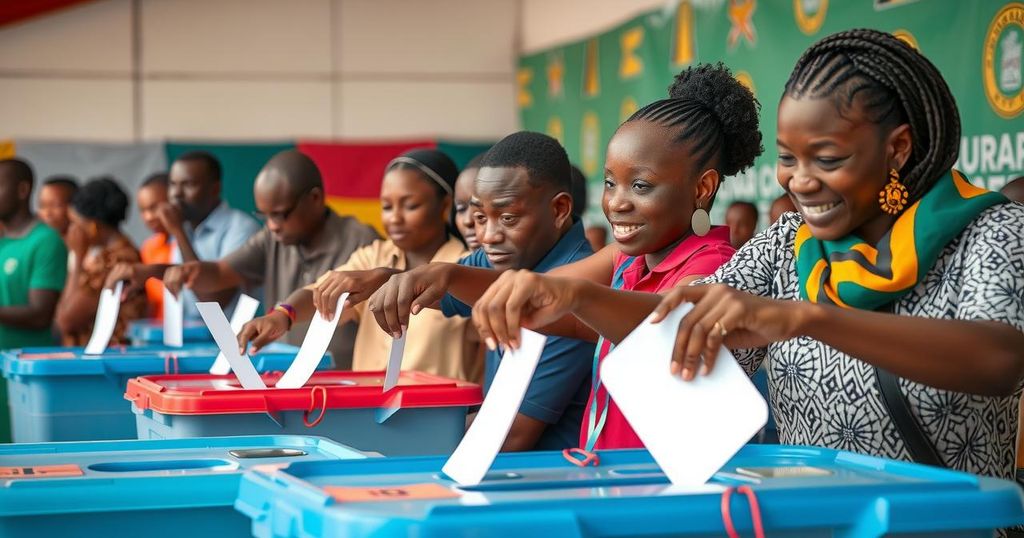World news
ACCRA, AFRICA, AKUFO - ADDO, BAWUMIA, DEMOCRACY, ELECTION, ELECTORAL PROCESS, GHANA, GOVERNANCE, GOVERNMENT, INTERIOR MINISTRY, JAMES NSIAH, JAMESTOWN, JOHN MAHAMA, MAHAMUDU BAWUMIA, NANA AKUFO - ADDO, NATIONAL DEMOCRATIC CONGRESS, NDC, NORTH AMERICA, NPP, OPPOSITION, UNITED STATES, WEST AFRICA
Jamal Robinson
0 Comments
Ghana Votes in Tightly Contested Presidential Election Amid Economic Challenges
Ghana’s presidential election sees a close race between Vice President Mahamudu Bawumia and former President John Mahama, amidst significant economic challenges following a debt default and inflation crisis. Voter sentiment emphasizes a desire for change, with both candidates outlining their plans to address the nation’s economic woes as the election results approach.
On a day filled with anticipation, Ghanaians cast their votes in a pivotal presidential election marked by a tight contest between Vice President Mahamudu Bawumia and former President John Mahama. The elections took place amid public sentiment fueled by hopes for economic recovery following a prolonged financial crisis characterized by substantial debt and soaring inflation. The incumbent, President Nana Akufo-Addo, is set to conclude his tenure as he transitions power after fulfilling a two-term limit as mandated by the nation’s constitution.
The economic plight of Ghana served as the predominant theme within the electoral discourse, particularly following the country’s recent debt default and the ongoing negotiations for a $3 billion bailout from the International Monetary Fund (IMF). Voting concluded at 1700 GMT on Saturday, with preliminary results anticipated the following day. Retired policeman James Nsiah expressed the prevailing frustration regarding economic conditions as he stated, “We want to vote for change, the economic situation is very hard” while waiting to cast his ballot in Accra.
Historically, Ghana has enjoyed political stability, with power alternating between its two leading parties, the New Patriotic Party (NPP) and the National Democratic Congress (NDC), since 1992. The NPP, under Bawumia’s candidacy, aims for a third consecutive term, embracing the slogan “Break the 8”. However, his campaign faces scrutiny due to the lingering dissatisfaction linked to President Akufo-Addo’s economic management. Upon casting his vote in his hometown, Bawumia expressed confidence in his campaign: “I am very hopeful of winning this election. I think we have done a lot of work with our message to the people and the message has been well received.”
Meanwhile, Bawumia, who has a background in economics, highlighted positive changes in the economy as indicators of progress, while advocating for continued digitalization and social welfare programs. The government recently instituted a temporary closure of all land borders to protect the integrity of the election process. Despite a reduction in inflation rates, many Ghanaians grapple with ongoing challenges in job scarcity and high living expenses, leading to a robust challenge from Mahama who proposes a transformative approach with promises to “reset” the economy.
Mahama, who presided over the nation from 2012 to 2017, contends that the expansion of industrial operating hours into a “24-hour economy” could resolve employment issues while expressing intentions to renegotiate parts of the IMF agreement. His potential appeal among disenchanted voters is complicated by historical memories of economic struggles and power outages during his previous administration. Perspective from the youth was well summarized by visual arts student Abdullah Mohammed, who stated, “I just want a good president who will bring changes. I don’t really care if it is Bawumia or Mahama.”
Both principal candidates hail from the northern region, an area traditionally aligned with the NDC but now seen as a crucial battleground due to its fragmented political landscape. Environmental concerns surrounding illegal gold mining resonated during the campaign, emphasizing the detrimental effects on communities and agriculture despite previous promises from the outgoing president to curb such activities. As Ghanaians await the election results, the outcome will significantly impact the nation’s economic trajectory and governance.
Ghana’s political framework is characterized by a history of democratic stability. The current elections emerge amid a dire economic landscape, following the country’s most severe financial crisis in decades. Economic factors such as inflation, national debt, and the implications of an IMF bailout have taken center stage, reflecting widespread dissatisfaction among the populace. The election also symbolizes a transitional phase, as President Nana Akufo-Addo’s term comes to a close, shaping the competitive dynamics between well-established political entities in Ghana.
In summary, Ghana’s current presidential election highlights the critical challenges facing the nation amid economic strife and public discontent. With candidates Bawumia and Mahama vying for leadership, the electoral outcomes are poised to reshape Ghana’s socio-economic landscape. The results will reveal whether the electorate favors continuity with the NPP or seeks a new direction under the NDC. As the results are finalized, the implications for Ghana’s governance and economic revival remain at the forefront of national concern.
Original Source: www.france24.com




Post Comment